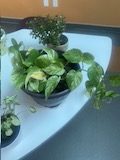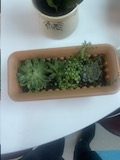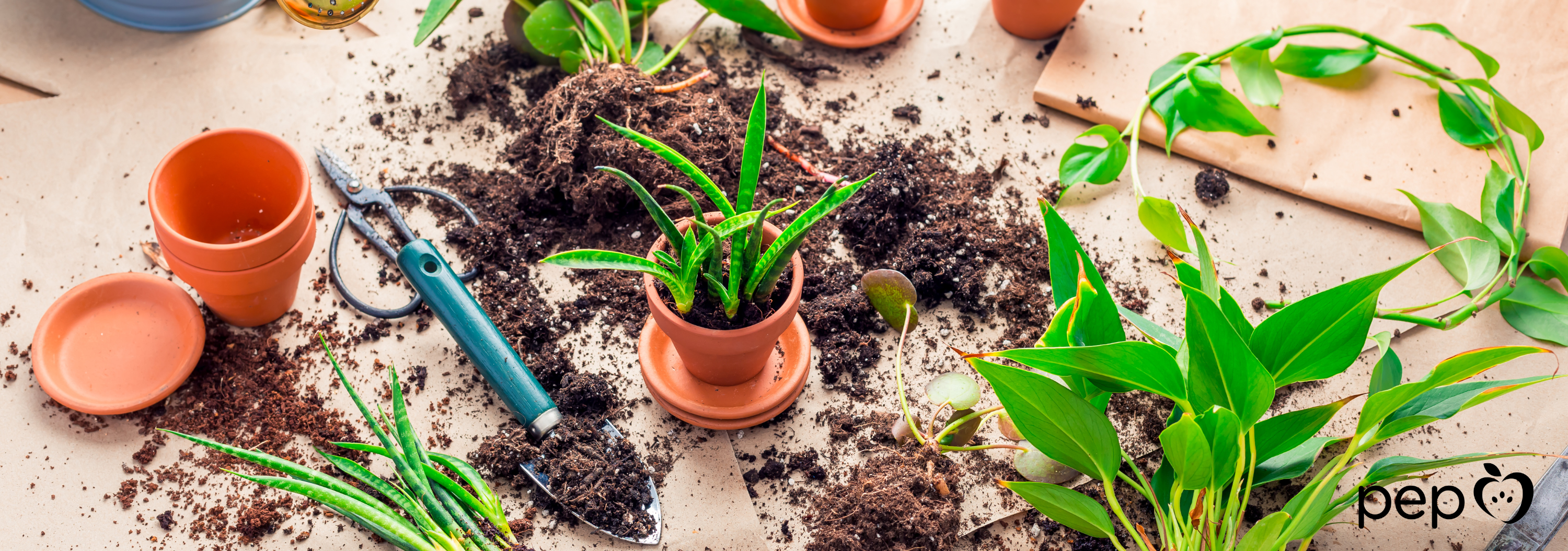Lessons that Take Root: Caring for Plants Promotes Social-Emotional Growth
Classroom lessons at PEP aren’t always about reading, writing and arithmetic. Students at PEP often struggle with mental health issues, trauma, or other serious challenges. Guided by the Neurosequential Model and PEP’s founding philosophy of Re-ED, PEP staff members know that for kids to learn, they must first be emotionally regulated. That’s one reason why there is such a concerted effort to focus on social-emotional learning in the classroom. For Rose Bouch, associate teacher-counselor, and Donavan Thompson, teacher-counselor, who lead the Dreamcatcher’s classroom at PEP Hopewell, caring for plants was the perfect activity for social-emotional learning.
 At the beginning of the school year, Bouch and Thompson had their students plant seedlings. Each of them selected a pot and were charged with the care of their plant. All year long, the students have visited and nurtured their plants, which grow in the window wells in the basement of the building.
At the beginning of the school year, Bouch and Thompson had their students plant seedlings. Each of them selected a pot and were charged with the care of their plant. All year long, the students have visited and nurtured their plants, which grow in the window wells in the basement of the building.
“Think back to when you first planted your seedling,” Bouch recently instructed the 6th and 7th graders in her class. “Is it the same today as it was when you first planted it?” She pauses and gives them a moment to think. “Are you the same today as you were then?” She waits. “Of course not! Just like your plant, you have grown and changed a lot. You should be very proud of yourselves.”
“At one point we had an infestation of gnats,” explained Bouch. “They had to take care of that.” She says that when the students take care of their environment, they have to think beyond themselves. They realize they are doing something to improve their surroundings and it feels good.
Stable Roots for Plants and for Students
Bouch says she has also tied this activity to lessons that are part of the Sources of Strength curriculum, a suicide prevention and resilience building program designed for younger students and used throughout PEP’s Day Treatment Centers. In one lesson students learned that for a tree to be healthy, it must have stable roots. If the roots are unhealthy, the tree is in danger of falling.
resilience building program designed for younger students and used throughout PEP’s Day Treatment Centers. In one lesson students learned that for a tree to be healthy, it must have stable roots. If the roots are unhealthy, the tree is in danger of falling.
The students thought about their own plants and how they had carefully watched for signs that the plants needed something. “I reminded them, you had to monitor your plant. There is a lot to pay attention to when caring for plants. Are the leaves getting yellow? What does it need? More water? More sunlight? You were the one responsible for making sure your plant had strong roots.”
Bouch continued, helping students make the connection. “You have to notice what you need – what keeps your roots stable. Have you had breakfast? Did you get enough sleep? When your roots are unstable, you’re in danger of ‘falling.’” She went on to explain the brain science to the kids, noting that when their needs aren’t met, they’re not operating in their prefrontal cortex. In other words, it’s hard to learn when your body is just trying to survive.
“The students really liked this lesson. I could see that it resonated with them. It made an impact,” said Thompson.
Social Emotional Learning a Focus at PEP
 It is lessons like these that help students understand the importance of emotional regulation. And at PEP, it’s not just one lesson in one classroom. The idea of emotional regulation and the strategies to foster it are a big part of every classroom’s daily routine.
It is lessons like these that help students understand the importance of emotional regulation. And at PEP, it’s not just one lesson in one classroom. The idea of emotional regulation and the strategies to foster it are a big part of every classroom’s daily routine.
For some kids, like those who attend PEP’s Day Treatment Centers, the ability to succeed at reading, writing and arithmetic lessons is contingent upon first learning to manage their emotions and behavior. That’s why lessons on social-emotional learning like the plant project in Bouch and Thompson’s classroom are essential. They teach the students the “why” of self-regulation and help them get to a place where they are able to take root and grow.
Learn More
For more information about social-emotional programming at PEP, visit our website. Contact Nicole Molnar, sr. director, clinical services, at 216-361-7760 ext. 110 or via email to see if a student in your district may be a good fit for Positive Education Program.
Please note, referrals to PEP’s Day Treatment Centers are made through school districts in consultation with parents. Interested parents or caregivers should contact their school administrator.
